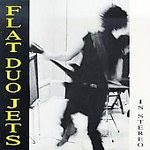
Album: Flat Duo Jets, In Stereo, 1992 reissue
Best Track: "Riot in Cell Block No. 9"
Lasting Memory: When I played this cassette Friday, I was shocked to discover that it wasn't an all-instrumental affair. I would've have sworn up until that point that it was, but only because when I saw Flat Duo Jets open for Reverend Horton Heat at Washington, D.C.'s 9:30 Club in, I guess, 2003, FDJ didn't sing a word during their 30-minute set. Odd, and also proof that I haven't listened to In Stereo very often since I pulled it from a 3-for-$5 bin somewhere.
I realize what I I've just described is a lasting misimpression rather than a lasting memory, but that is apt in the case of In Stereo because the ablum, while perfectly servicable as a collection of traditional rockabilly, is pretty forgettable as an artistic product. In fact, the only reason I'm tagging "Riot" as the best song from the ablum (a six-song maxi-EP, really) is because it is the only song I can remember anything about while typing up this blog post 32 hours after giving In Stereo a play.
The only reason "Riot" proves memorable, though, is because it is a rockabilly standard. A partial list of people who have performed it to greater and lesser acclaim over the past half century includes Wee Willie Harris (1958) Johnny Cash (1962), Dr. Feelgood (1979), and The Blues Brothers (1983). I don't know who Dr. Feelgood is/was, either, but here's a video of that early British punk band for the curious.
This seems to be the FDJ take on "Riot." I'm getting a new computer delivered sometime this week, but for the purposes of this post, I still don't have sound on my computer.
If you clicked on the FDJ link, you'll probably hear what I'm writing about when I mention that the band is fine but unimpressive -- in the sense that they largely fail to make an impression. The playing is profecient, the singing has genuine emotion, and the band would have been right at home in the Sun Records stable of the late 1950s.
That last bit of genuine praise also points directly to FDJ's Achilles' heel. FDJ, performing and recording the mid-1980s, sounded so much like so many bands from the 1950s that there is really no point or particular reward in listening to the latter-day product. Which is kind of shame because, again, FDJ was good at mimicking. They just weren't good at contemporizing.
Think of Stray Cats. Brian Setzer, Slim Jim Phantom, and Lee Rocker stole every note and beat and lyric they ever played and sang, but they also used what were then cutting-edge studio tricks and new media like MTV to make Built for Speed a deservedly huge hit that added to, rather than simply reproduced, a long-extent subgenre of popular music.
Think also of Reverend Horton Heat. Everyone should always be thinking about the Rev at some level.
Unlike those contemporaries, FDJ opted for revenance over revision or revolution. Too bad, really. But at least FDJ made themselves into the very image of their influences. Call it "homage" because "aping" is an ugly word, and because FDJ lead guitarist Dex (full name from liner notes: John Michael Dexter Romweber) wrote on the album sleeve (cassette jacket?) "We'd have parties where I'd drink a whole bottle of red wine while we listened to Gene Vincent, Ritchie Valens, Bo Diddley, Buddy Holly, Eddie Cochran, The Cramps, Ronnie Dove, and The Coasters" (emphasis in original).
In conclusion, then, I'll give FDJ points for skill and honesty, subtract one point for pretentious liner notes content and formatting, and then I'll file In Stereo away again for possible future rediscovery and reassessment.
Up Next: fIREHOUSE, "if'n", 1987
No comments:
Post a Comment